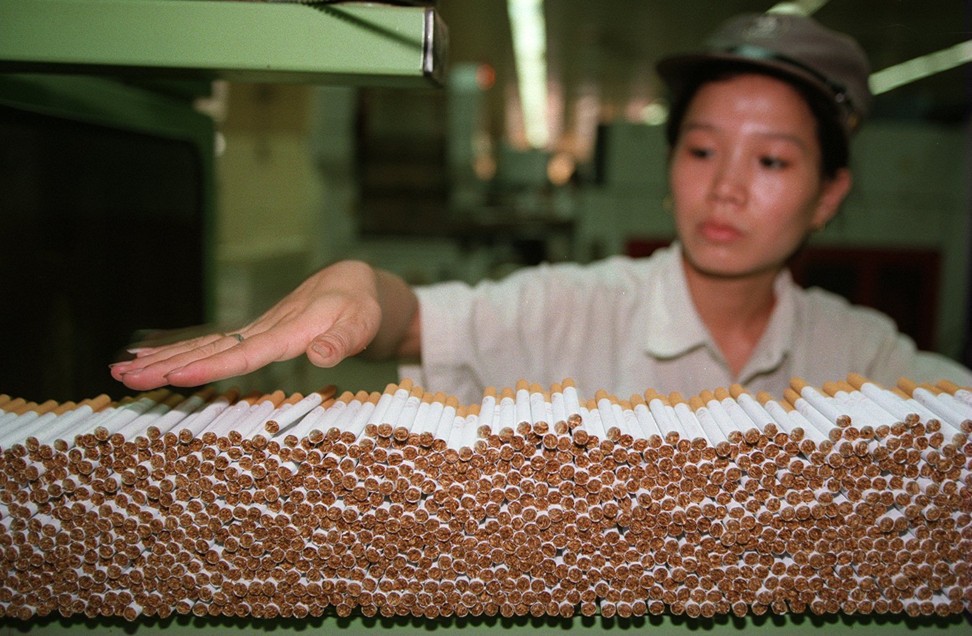
Tobacco should be long gone if anyone truly cared about China’s public health, instead of letting it raise funds in an IPO
- China’s tobacco virtual monopoly employs an estimated 17 million people, contributing to 11 per cent of the country’s tax revenue in 2016
- One in three of the world’s 1 billion smokers are in China, where lung cancer claims 2 million lives every year
For my 50th birthday, my daughters very creatively gifted me the December 2 1950 edition of the Financial Times. That was the edition published on the day of my birth. Since I had worked for almost two decades for the FT, the gift was a wonderful idea.
Apart from the reminder of what a fusty parochial thing the FT was back in 1950, the paper carried a fascinating full-page feature on its centre pages about an exciting newfangled innovation: the filter-tipped cigarettes.
I had naively grown up thinking that filters had been introduced in cigarettes as a health measure to reduce the nicotine and tar smokers ingested. But no such thing. These were naive times where no one had yet discovered the connection between smoking and cancer. In fact, filters were introduced because of tobacco shortages and wartime tobacco rationing.
The FT’s correspondent confidently predicted that this newfangled fashion would never last, and would be dropped as soon as rationing was lifted – one more example, if any were needed, of our dubious journalistic track record in predicting the future.
The article reminded me that the tobacco industry – which I rarely think about, and innocently assumed was in steep decline – was in fact in robust good health despite decades of ruinous bad press, and the industry’s well-documented role as a killing machine.
As a lifetime non-smoker, the logic or appeal of taking leaves, drying them, setting them alight and inhaling the smoke has always puzzled and bemused me – all the more so since we know that the smoke kills you.
How is it that even today, a fifth of the world’s adult population smokes cigarettes of one kind or another? How is it that according to the Tobacco Atlas, 99 per cent of adults in Andorra and Albania still smoke – a question for another day perhaps?

At least in China, it remains a mainly masculine vice. China National Tobacco, a virtual monopoly at the heart of the world’s largest cigarette-smoking nation, seems to have glided immune through the global vilification of the tobacco industry, and has felt little of the squeeze borne by the rest of the industry – hence its willingness to list its procurement arm in Hong Kong.
There are about 350 million Chinese smokers, according to World Health Organisation (WHO) estimates, including over 60 per cent of Chinese men and around 40 per cent of China’s male doctors (only 1 per cent of China’s female doctors smoke – which suggests that if you want your doctor to outlive you, you would be well-advised to choose a woman doctor).
In compliance with WHO guidelines, the Chinese government openly acknowledges the harmfulness of smoking, and subscribes to a wide range of policies to stop smoking in public places, and limit tobacco advertising.
But there is a hitch as far as its anti-tobacco position is concerned. China National Tobacco, otherwise called the State Tobacco Monopoly Administration controlled by the Ministry of Industry and Information Technology, operates 130 factories across the country, employs an estimated 17 million people, and in 2016 contributed US$160 billion in profits and taxes to government coffers – an estimated 11 per cent of government tax revenues.

Aside from quibbling about what cigarette manufacturing has to do with information technology, the conflict of interest is obvious, and explains why the tobacco industry is in such robust good health in China at a time when the global business is stagnant or – in most developed economies – in steady unmourned decline.
Today, China grows over 3 million tonnes of tobacco (mainly in Yunnan and Sichuan), far ahead of India, Brazil, the US and India, which together account for barely half of China’s production, according to Euromonitor.
China accounts for four of every 10 cigarettes smoked worldwide. The WHO says about a billion people still smoke worldwide, consuming 5.4 trillion cigarettes a year with a retail value of almost US$700 billion. Around 80 per cent of these smokers are in the world’s low- and middle-income countries, and 350 million of them are in China.
Despite the national monopoly (foreign brands are allowed to account for between 2 to 3 per cent of the market), China’s smokers can choose from over 900 brands, giving the entirely false impression of variety and choice.
China’s striking leadership in tobacco production and cigarette consumption might be a lesson to the world about the commercial success and driving role of state-owned enterprises and good old national monopolies, were it not for the sad and embarrassing status of the business worldwide – and that it is linked to an estimated 2 million lung cancer deaths in the mainland every year.
Despite the harm to human health, there is a brash self-confidence in China National Tobacco that, after decades of vilification by the western media, is wholly absent in the low profile presence of Philip Morris, British American Tobacco, Japan Tobacco and Imperial Tobacco, even in their growth markets in developing countries.
Surely there is an irony that, in spite of the current fierce US campaign against the anti-competitive role of China’s state enterprises and national monopolies or oligopolies, neither a whimper has been heard against this most-egregious and long-lived of all Chinese monopolies, nor on the potential to export US tobacco.
If anyone truly cared for the health of China’s people, this would be an industry long gone. The fact that we see plans for the monopoly to raise international funds on the Hong Kong stock market, speaks cynical volumes instead.
David Dodwell researches and writes about global, regional and Hong Kong challenges from a Hong Kong point of view

